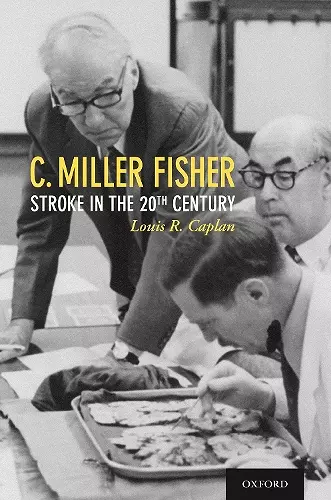C. Miller Fisher
Stroke in the 20th Century
Format:Hardback
Publisher:Oxford University Press Inc
Published:25th Aug '20
Currently unavailable, and unfortunately no date known when it will be back

When Charles Miller Fisher was born in 1913 there was very little scientific knowledge about stroke. But thanks to him, our understanding of stroke and of other brain disorders are now well established in every neurology training program around the world. C. Miller Fisher is his story: his life, his method of study and of research, and his contributions. This work, reinforced with unequalled access to the CMF archives overseen by the Fisher estate and told in his own words (italicized in the text) from his memoirs, will shed light on one of the most important clinicians in North America and the world. He devoted his career and the great majority of every waking day to the study of stroke, both in the pathology laboratory and in people. Fisher's discoveries and contributions and those of the individuals that he trained changed the knowledge basis of stroke and vascular disease for everyone.
This is a book to be studied upon ... as an investigation into one of the most important medical conditions of the 20th century. * Alain Touwaide, PhD, The Huntington, Doody's Review Service *
This book is full of wit, interesting encounters, and a detailed history of prominent figures and discovery in medicine. The author does a good job at elucidating major life moments that built Fisher's character and set him on his path for his major discoveries that changed medicine forever. Fisher loved being a physician, he loved learning, and, most of all, he loved his patients. Reading C. Miller Fisher: Stroke in the 20th Century is a humble reminder of the beauty of medicine, the scientific method, and the incredible discoveries that Fisher gave the scientific community. * Jonathan Pineda, MS, Tarek Y. El Ahmadieh, MD, Salah G. Aoun, MD, and Stephen Figueroa, MD, Neurosurgery *
In this scholarly biography, Caplan has not only chronicled Miller Fisher's life, but has also described his extraordinary contributions to neurology, especially to cerebrovascular disease. The extensive references and images all serve to illustrate the history of stroke medicine in the second half of the twentieth century, making it an interesting and inspiring read. * Dr Arpan K Banerjee, MBBS (LOND), FRCP, FRCR, FBIR, Hektoen International *
Seldom has a medical story been told so well, so credibly, and so accurately by someone who has been a partner and participant in the advances that he describes. It is a delight to read by anyone with a health sciences background, and a must for those in the field of stroke. * Vladimir Hachinski, World Neurology *
Learning from the past is important, mostly from imminent clinicians in small circuits of excellence, as well as adapting from new morphological, biochemical, pharmacological, and functional technological methods and their interaction with many other disciplines close to and surrounding neurology. It is the merit of this wonderful book written by a pioneer of stroke neurology, Louis Caplan, whom both undersigning authors have much to thank in their own time of scientific interaction. * Michael G. Hennerici, Mannheim/Heidelberg (Germany) and J. Bogousslavsky, Montreux (Switzerland), Cerebrovascular Diseases *
I will treasure this book. Stroke neurology under Fisher was something extraordinary, and Caplan reminds us how valuable it was. After closing this remarkable book, I realised that Fisher's transformative era, with its eagerness to see pathophysiology anew and its willingness to overturn assumptions while maintaining masterful attention to neurological detail, might perhaps now be distinctly and sadly no more-but hopefully not. * Eelco Wijdicks, The Lancet Neurology *
ISBN: 9780190603656
Dimensions: 239mm x 155mm x 25mm
Weight: 635g
288 pages